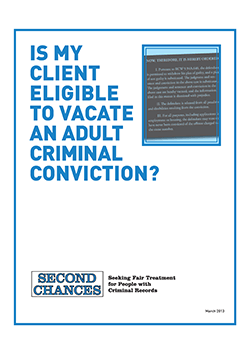March 2013
INTRODUCTION
This guide is intended for social service providers and others who work directly with individuals who have criminal records. It is intended to provide general information about the requirements to vacate and is not a substitute for legal advice.
Many people with a criminal record want to “expunge” or “clear” their criminal histories. While Washington law does not permit the destruction of adult, conviction records, some people may be eligible to “vacate” a conviction record.1
When a court “vacates” a conviction, it withdraws a guilty verdict and dismisses the case. If a conviction is vacated, a person is permitted by law to say that he or she has never been convicted. The Washington State Patrol does not report vacated convictions, but court records will still be available. If the case is reported in a background check, it should be clear that the case was “dismissed” or “vacated.”
If you have questions about vacating criminal convictions, or would like to refer a client for more information or services, you should contact the ACLU of Washington’s Second Chances Project. You can reach us at 206.624.2180 or through our website: www.aclu-wa.org/secondchances.
Your client meets the requirements under Washington Law (RCW 9.96.060) for vacating a single misdemeanor if you can answer “YES” to all of the following questions:
|
The offense was not a violent offense, or an attempt to commit a violent offense, as defined by RCW 9.94A.030.
|
|
The offense was not a DUI offense listed in RCW 46.61.502, RCW 46.61.504, or RCW 9.91.020.2
|
|
The offense was not a sex offense, or attempt to commit a sex offense listed in RCW chapters 9.68, 9.68A, and 9A.44.
|
|
The person has completed the terms of the sentence, including paying all fines.
|
|
It has been three years since s/he completed the terms of the sentence. 3
|
|
Since completing the sentence, s/he has not been convicted of a new crime in any state or federal court.
|
|
There are no criminal charges against the person pending in any court.
|
|
During the past five years, s/he has not been subject to a domestic violence protec- tion order, no-contact order, anti-harassment order, or civil restraining order.
|
|
S/he has not previously vacated any conviction. 4
|
An individual who wants to vacate a conviction for prostitution and who was the victim of certain trafficking offense is ineligible if s/he has previously vacated any prostitution convition. If your client wants to vacate a prostitution conviction, contact an attorney.
Your client may meet the requirements under state law (RCW 9.94A.640) for vacating a felony conviction if you can answer “YES” to all of the following questions:
|
The offense was not a violent offense as defined by RCW 9.94A.030.
|
|
The offense was not a crime against persons as defined by RCW 43.43.830.
|
|
The offense was not a DUI offense listed in RCW 46.61.502(6) or RCW 46.504(6).
|
|
The client has received a “Certificate of Discharge” certifying that s/he has com- pleted all of the terms of the sentence, including payment of all fines, fees and restitution.
-OR-
The client has completed all terms of sentence and is eligible to receive a certificate of discharge.
-OR-
The conviction was before July 2000 and (a) the client has completed all terms of the sentence except paying fines and fees, (b) ten years have passed since the cli- ent was released from prison or jail; and (c) the court did not enter an order ex- tending jurisdiction to collect fees and fines.
|
|
The crime was a class C felony and it has been 5 years since the client received or became eligible for the certificate of discharge.
-OR-
The crime was a class B felony and it has been 10 years since the client received or became eligible for the certificate of discharge.
|
|
There are no criminal charges against the individual pending in any court.
|
|
Since receiving or becoming eligible for a certificate of discharge, s/he has not been convicted of any crime.
|
IV. If the client has MULTIPLE convictions
Typically, a person can vacate only his or her most recent conviction if it meets the statutory requirements. In some circumstances, a person who has multiple convictions can vacate more than one conviction. If each of the convictions, standing alone, could be vacated, you should refer the client to an attorney.
V. If you aren’t sure whether the client qualifies
If you think that your client might qualify for vacating a conviction, but aren’t sure whether s/he meets some of the requirements, you should refer your client to an attorney. An attorney can help your client review court records and the laws to determine whether he or she should petition to vacate.
VI. If you’d like more information and attorney assistance
For more information, see the ACLU of Washington’s “Guide to Getting and Understanding a Criminal Record”, and our “Guide to Criminal Records and Employment”, available at our web site: https://www.aclu-wa.org/know-your-rights.
1 Juvenile convictions are governed by different laws. Under RCW 13.50.050 many juvenile records may be sealed. For more information, visit www.sealyourjuvenilerecord.com.
2 There are additional requirements for other DUI or DUI-related crimes. If the offense could be considered a “prior offense” as defined by RCW 46.61.5055 (14)(a), it cannot be vacated if the applicant has had a subsequent drug or alcohol violation within ten years of the date of arrest for the prior offense.
3 There are additional requirements for domestic violence crimes. If your client’s crime involved domestic violence, contact an attorney.

